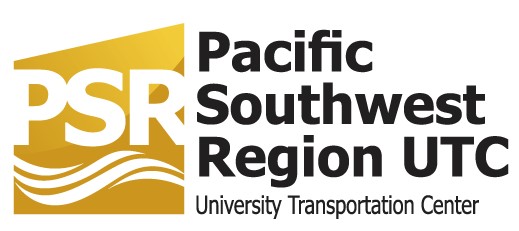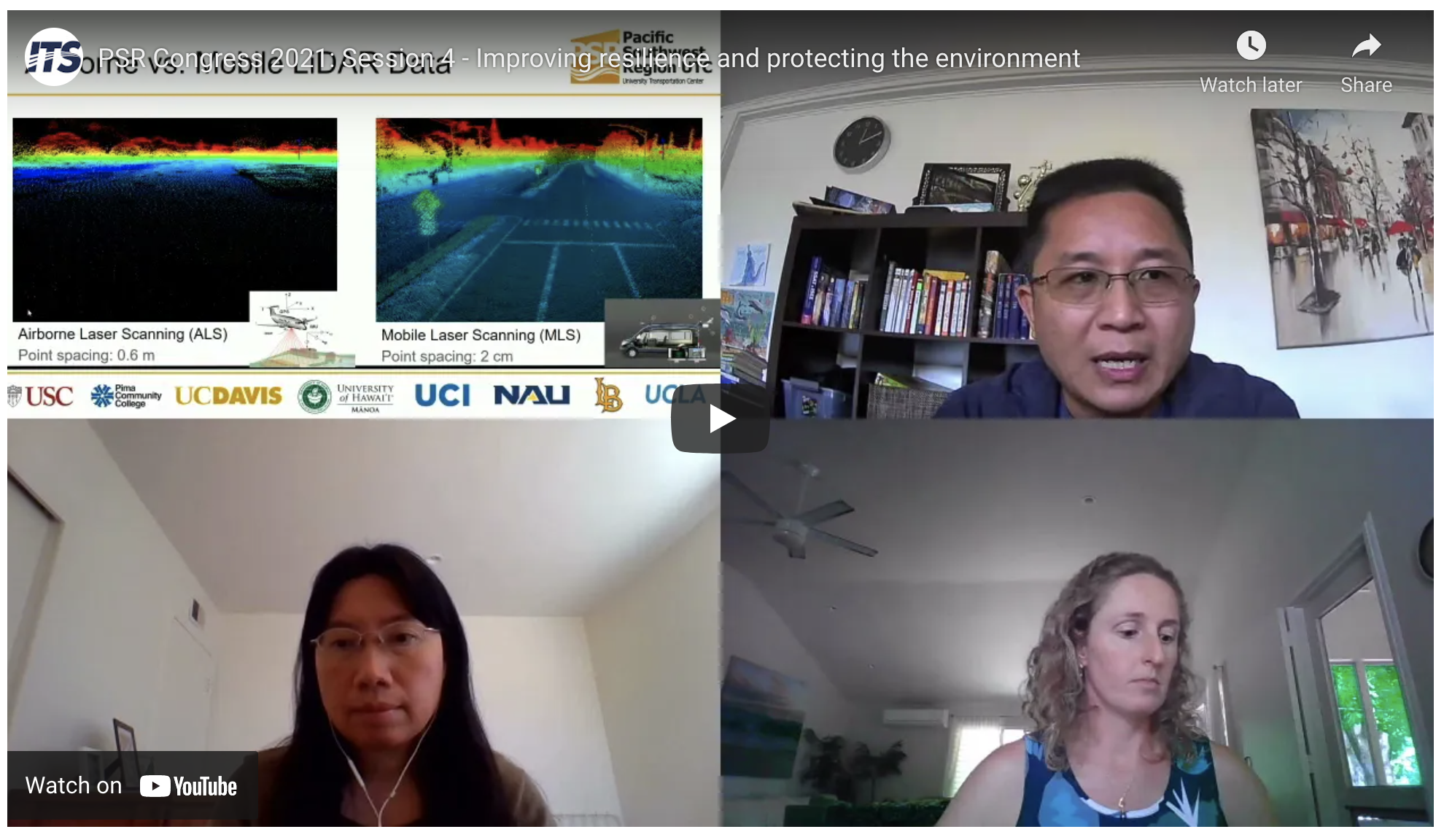News | PSR Congress 2021 - A Remote but Rewarding Experience
Stop the VideoNews

by Katie McCammon and Sam Chiu
The Fourth Annual Pacific Southwest Region University Transportation Center (PSR) Congress took place virtually on April 12th and 13th and was filled with transportation information to inspire, motivate, and encourage imaginative problem-solving skills for the transportation research community. There were many subjects discussed in the main room and side rooms during the on-line conference, covering topics from freight delivery to the implications of sea level rise on transportation systems. The PSR Congress showcased the significant research within the field of transportation being conducted across the PSR partner campuses.

Day One featured opening remarks from PSR Director Dr. Genevieve Giuliano and land acknowledgements from Dr. Susan Handy, Professor in the Department of Environmental Science and Policy at the University of California, Davis. This led into keynote speaker Dr. Robert Hampshire, the Acting Assistant Secretary for Research and Technology at the U.S. Department of Transportation. Dr. Hampshire spoke about how the key element of the Biden administration’s “Build Back Better” plan should be technological innovation. He said that a focus of this innovation would be a solid foundational workforce capable of implementing these big changes and trained on how to hire and integrate workers equitably. The Congress attendees then split into two panel sessions, one focusing on “technology to address transportation problems and improve mobility” and the other looking at “managing mobility in high growth areas.”
Some of the most significant topics discussed on day one focused on the need to collect more data to deal with higher pollution levels of heavy duty freight, how to address sea level rise from a transportation perspective, the need to implement green infrastructure to adapt to the changing climate, and assessing transportation equity. Ph.D. candidate Yiqiao Li from UC Irvine presented data showing how to improve data collection methods using 3D pointset technology. This 3D technology allows researchers to pinpoint the most impactful differences between freight designs. Professor Qi Chen of the University of Hawai’i discussed research focusing on roadway vulnerabilities due to increased rates of flooding on the Hawaiian archipelago. Hawai’i is projected to face a disproportionate amount of sea level rise and land loss, so research to map roadway vulnerability is extremely important to those living on the islands. Professor Chen discussed the use of mobile LIDAR data showing distinct clarity in mapping the details of land compared to USGS systems. The LIDAR scanning system also presented clear imagery and details of the roadways. Ultimately the data showed that a combination of both airborne and mobile data would help map out land and road detail more than any other option, which will improve vulnerability assessments. Assistant Professor at the University of Hawaii Wendy Meguro connected the vulnerability of transportation systems to the need for green infrastructure. To deal with increased erosion, flooding, and land retreat, the data shows how living shorelines adapt to changing conditions better than non-organic methods. The project called for the restoration of living shorelines and presented community, state, national, and international methods of impact and outreach. A presentation by Dr. Sarah R. McCullough and graduate student Sequoia Erasmus focused on an assessment of transportation equity within the state of California. Using various interview methods, they learned a great deal from those living in marginalized communities within urban areas. Their research helps to expand the transportation conversation to include those who are most profoundly affected and underscores the importance of including equity experts to give communities more power in the decision making process.
Day Two of the Congress opened with a tribute to the late Dr. Martin Wachs, who was a distinguished Professor Emeritus and founder of the UCLA Institute of Transportation Studies. Dr. Genevieve Giuliano, Dr. Brian Taylor, and Dr. Thomas O’Brien all shared their gratitude for Dr. Wachs’ lifetime of work in transportation and expressed their sadness on the recent loss of this pillar of the transportation community. The day continued with partner highlights, PSR Student Award Presentations, table discussions on air quality and vehicle emissions and mobility justice/environmental justice, and lastly a career pathway panel where students could hear from those who have found different professional roles within the field of transportation. Some highlights of the table discussions included a closer look at President Biden’s jobs plan and how infrastructure should include increased focus on housing and equity, as well as a discussion on how to expand electric vehicle access to lower income populations.
The concluding discussion of professional opportunities and career pathways included Peter Newbegin, an Impact and Improvement Director at the United Way of Tucson, Danielle Dirksen, a Capital Projects Outreach Intern with the Orange County Transportation Authority, and Dr. Jamey Volker, a Postdoctoral Researcher at UC Davis. These panelists discussed the importance of getting hands-on experience while being a student through work, internships, and research opportunities. All of the speakers indicated that they got to the field of transportation due to their focus on improving the environment and helping underserved communities and their involvement ranged from legal to humanitarian efforts.
This year’s PSR Congress, while remote, provided opportunities for thoughtful and in-depth discussions. We look forward to next year’s event when we return to an in-person conference where these fruitful conversations can continue.
The event program and video recordings of the Congress are available here: https://its.ucdavis.edu/news-and-events/conferences/psr-congress/

News Archive
- December (1)
- November (6)
- October (4)
- September (2)
- August (3)
- July (4)
- June (3)
- May (7)
- April (8)
- March (11)
- February (8)
- January (7)
- December (7)
- November (8)
- October (11)
- September (11)
- August (4)
- July (10)
- June (9)
- May (2)
- April (12)
- March (8)
- February (7)
- January (11)
- December (11)
- November (5)
- October (16)
- September (7)
- August (5)
- July (13)
- June (5)
- May (5)
- April (7)
- March (5)
- February (3)
- January (4)
- December (4)
- November (5)
- October (5)
- September (4)
- August (4)
- July (6)
- June (8)
- May (4)
- April (6)
- March (6)
- February (7)
- January (7)
- December (8)
- November (8)
- October (8)
- September (15)
- August (5)
- July (6)
- June (7)
- May (5)
- April (8)
- March (7)
- February (10)
- January (12)















